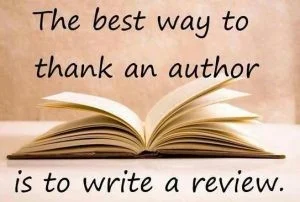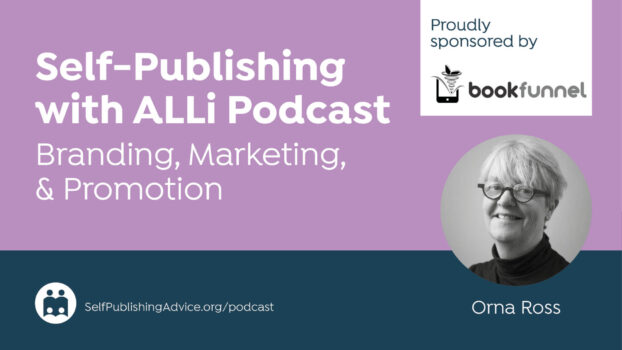
US indie author of fantasy novels Karen Myers (Photo by Sarah Dane)
US indie author Karen Myers speaks out against the common practice for self-published authors to ask their readers to post reviews of their books on Amazon, Goodreads, and bookblogs. Do you share her view or disagree? Read her rationale then join the debate via the comments box…

See that illustration? You know what’s wrong with it?
Readers don’t owe anything to authors, including thanks, and we shouldn’t presume that they do if we want them to continue as customers.
At least, that’s what I think. And here’s why.
Back Matter Checklist
Authors often seek recommendations on what to include in the back matter of their books. The potential list is long:
- Thanking the reader
- Asking for book reviews
- Pointing the reader at links for more information about the book they just read
- Offering the reader a newsletter to subscribe to, for information about books (with perhaps a bonus giveaway)
- Offering the reader a way to contact the author (sometimes including links to social media)
- Telling the reader about the next book in a series, or about another book
- Presenting the first chapter of the next book in a series, or another book
One of these, the “ask for review,” was recently in the news as something that traditional publishers have begun including in the back matter of their books, apparently learning from independent authors.
When I first published my books in 2012 and for a a couple of years thereafter, I also asked for reviews in the back matter, just as a standard practice, but I’ve stopped doing it.
Why I No Longer Ask for Reviews in my Books' Back Matter
Why would I do that? Don’t I want them to leave book reviews?
Let me explain…
Of course, I would like to have more reviews — who wouldn’t? But what I would like, even more, is for someone who has just finished a book to be eager to look at and buy my other books. That “bird in the hand” of a satisfied reader is far more important to me than another drop in the review bucket for a potential reader down the line. My customer is a customer first, way ahead of being a member of my marketing team.
I think asking for the review smacks of desperation and comes across as a bit unprofessional. I don’t want my reader to start thinking of me that way.
The Impact on my Reviews
And you know what? It doesn’t make any difference to the number of reviews I get, near as I can tell. The review rate seems to be about 1-3% of units sold (I don’t do freebies), and that seems to be good across most current and active authors, trad or indie.
Think about what that means…
That means that 97-99% of my readers didn’t leave a review. And every one of them probably felt a bit uncomfortable about it, if they read the request. Did that make them less likely to buy another book? Who knows?
Here’s my take on the psychology of it (aside from the vibe it sends)…
If the person is accustomed to writing reviews, then they’ll write one or not, regardless of what I say, just as if it were any other author’s book.
But if they’re not so accustomed, we’re asking them to change their behavior to accommodate us. We’re asking for a favor.
But that’s not the transaction deal our readers make — the deal was, they give us money, and we give them entertainment.

Not everyone wants to learn a new behavior
It’s as though we only published ebooks and asked people who only read print to learn how to use a new format just so they can access our books. That’s asking them to change behavior, too.
Unless we are in the “super-cool, new trend” category and we’ve encountered a techie (and even then), asking people to change their behavior to do us a favor isn’t really going to work. And it may embarrass or guilt the recipient, which is not how we want them to think about us.
Better to just thank them, give them the “for more information” and newsletter signup links, and send them on to the “1st chapter of next book” with its link so they can buy the next one while they still like us.
That’s more important than a book review any day.
OVER TO YOU Do you agree with Karen's approach? Have you changed your process regarding reviews lately? Do you have a different way of acquiring reviews? Join our conversation!
#Authors - why you shouldn't ask readers for reviews - opinion post by @Hollowlandsbook Share on XANOTHER GREAT POST ABOUT BOOK REVIEWS – and this one will make you smile!




No one I know who asks for reviews believes the reader “owes” them anything. I always ask, but mostly I leave the link back to the sales page to make it easy for them.
After that, if I don’t get the 50 reviews that is the magic number on Amazon to trigger the site including the book in recommendations and higher listings, I beg. Shamelessly. I send out a plea to my mail list. What I never do is use a service. Once I’m at 50, then over the natural life of the book, people will review or they won’t, whatever.
Reviews translate into money. I ask, plead, grovel and nag. I also love my readers and it’s okay with me if they aren’t the review kind. They don’t owe me a damn thing, I owe them. But an Indie has to do their own self-promotion. Their own clawing their way up the cliff face. We didn’t make the Amazon review system. We do have to deal with it.
Thank you. Great point. I too felt like this. Good to have it validated by an expert 🙂
We like to do book reviews. Hi Everyone,
We do free book reviews if your book interests us. We are a group of retired people in New Zealand who play golf, read books, write books, and do free book reviews if we like your book. We write books too, so we like to see what other authors are currently doing and it is amazing to see what writers are creating. We try to post our reviews on Amazon, Goodreads, Barnes & Noble and our social media.
See our book review page for more info > >
https://www.teamgolfwell.com/free-book-reviews.html
#bookreviews #kindlebookreviews #amazonbookreviews #indiebookreviews
[…] Opinion: Why Readers Don’t Owe Authors Book Reviews […]
[…] Opinion: Why Readers Don’t Owe Authors Book Reviews […]
[…] Opinion: Why Readers Don’t Owe Authors Book Reviews […]
It is always best to do what feels right to the author–and both ways work. I think it is a matter of temperament. I feel at ease asking for reviews BUT I also add an address for the reader to contact me directly if they do not want to leave a review, letting them know I enjoy their feedback either way. Frankly, I love getting comments, feedback, any kind of response. Without my audience, I am writing for myself alone. My opinion matters to me… :-), but sharing and communicating with an audience makes all the difference. JF Penn and Mark Dawson ask for reviews in their books, and they have made quite a few sales. It matters that we follow through in alignment with our own value judgment. It’s not a law, just a decision.
Readers don’t owe us anything, I honestly believe most readers don’t feel that way. It’s an ask. There’s a MAJOR reason: Amazon in particular sorts authors and titles by ranks and those ranks are in fact directly related to reviews. The impact on sales is interesting, my reviews rate was considerably more than 1-3% of sales, running at almost 34% reviews to sales.
The HUGE problem is Amazon’s review purging process. I had 50 reviews removed from one title on the pretext they were “friends and family members.” 3 reviews from friends, not all 50, 47 were from “strangers” but Amazon didn’t care. All 50 removed. That title’s ranking fell by almost 35000 places. That is a major marketing problem that’s also grossly unfair to the 34% of readers who took the time to review that title.
If you don’t ask, you don’t get. If you don’t get, your title is ranked lower and is omitted from “free” marketing by Amazon, the distributor. Food for thought.
[…] As we have seen, writing can be a not-so-alone activity, but beware the company you keep. Anne R. Allen lists some of the toxic people that can sabotage your writing career, and Karen Myers discusses the opinion that readers don’t owe authors book reviews. […]
I believe gently asking for a review is excellent, and yes I have based purchasing decisions on reviews. When in my working days (now retired) it was normal to ask a customer for a lead to another potential customer. Those leads were almost always positive and much new business was generated that way.
And like my old customers, readers are free to not leave a review as they see fit. The manner in which you ask is the critical element. Now I have to remember to go back and add that request to my first book and then make sure I don’t forget again.
I’ve written two novels. For the first one I didn’t ask for readers to leave a review in the back matter but for the second one I did. It didn’t seem to make any difference as the ratio of sales to reviews was about the same for both books. On the flip side, I’m an avid read and I ALWAYS leave a review.
It is nice to see this!
I, too, have made the decision not to ask for reviews. Asking readers for anything more than to read my stories is going a bit too far. If they read a story, then they have invested time and effort to do so (over and above the expense to them if they purchased the story). It seems an even trade, since I invested time, effort, and expense to write the story. Beyond that, I think my readers are smart enough to understand how and where to leave a review, should they wish to do so. And I think they are smart enough to make the decision on their own as to whether to do so or not.
Rather than enter the rather sordid review-chase, I focus instead on engagement with my readers via the various methods I give them to contact me directly with their thoughts, and to contact each other for discussion. It seems a more productive and fulfilling use of time, and a more honorable stance toward readers who have given me the honor of their attention.
Here’s my review of this posting: don’t take advice from an author with no sales.
I’ve been thinking about this question from the perspective of a reader. Like most writers, I love to read. I’m a fanatical reader, have been since I learned how. I don’t think I’ve ever bought a book based on reviews. I choose a book because someone I trust says I’ve GOT to read it. They’re crazy for me to read it. The author didn’t ask them to recommend the book to me. They just couldn’t help themselves. As a writer, I’ve stopped asking for reviews, because of how it makes me feel when someone asks me for one. And the pressure for authors to get Amazon reviews has increased into pressure to get 5-star reviews. I feel hustled. Every where I turn someone’s asking me to review them. Authors, stores, websites, the dentist, for crying out loud. I agree with Karen, my readers don’t owe me a review. They spent their money on my book, why isn’t that enough? Many of my readers email me to say how much my writing means to them. That’s more important to me than a review.
I actually think it’s perfectly okay to ask for a review. Just so long as you don’t ask for anything other than a completely honest one. My own end-of-book review request reads (in part):
“Yes, I’m asking you to pay it forward and write your own review of this booklet and publish it on Amazon. Just write an honest review and give this booklet as many stars as you think it deserves.”
Just as an addendum, I didn’t really address your key point in my post.
You’re right of course: we are asking for a favour. I think that’s perfectly okay… we just need to accept that when we ask for a customer review, we are asking a stranger to do us a favour, and set our tone accordingly.
And accept that the answer might well be “No.”
[…] Karen Myers Do you – should you – ask readers in the back matter of your self-published books to post […]
The review system is absolutely central to Amazon’s business model. I think people expect to be asked for their opinion. They are notoriously reluctant to buy a book with no reviews. The logical corollary to that is they should leave one more often than not.
Asking for a review is neither right nor wrong, in my view. Now, I get that some authors are uncomfortable asking, but when multinational corporations are pleading with you to like their Facebook page, that pretty much tells me this kind of marketing is okay. I have done what Karen says and placed a gentle reminder at the end of my books asking for a review, but to be honest, it hasn’t led to very many. As she points out, if people are already in the habit of doing it, they will—whether you ask or not. And I don’t think asking is going to make readers feel guilty if they don’t. Most likely, as in the case of my books, they’ve just ignored your ask.
The thing is, Amazon itself, asks me by email to post a review about the book I purchased from them — after an amount of time so as to have read the book.
But I don’t feel comfortable asking for a review. On the other hand, as Steven says, every website we visit has “like us on FaceBook” plastered all over. That is equally bothersome.
Once I create a blog, I will let the reader know about it, and that it’s open to read and to post on.
And by the way, I don’t believe giving books away for free on Amazon is any way to treat oneself as a professional. And people don’t value free things.
not sure I agree with what you are saying. there is way too much info you don’t have to make that statement.
We had to make a choice at Triskele Books and discussed this at length. Finally, we added a page which includes Find Out More, our websites and blogs for readers and writers, and a reminder for those who may not think about reviewing to do so.
My toes curl when I see those memes about readers’ duties on social media. As Karen says, it smacks of unprofessionalism and charity.
Having said that, a certain element of my crime novel readership are not used to voicing opinions publicly. Some of my readers only reviewed because they saw the message at the end of the book.
My ethic would be to avoid pressure and pleading, but let people know their opinions are valued.
Amazon sticks a review form on the page when you finish a book on kindle and they email you to ask whether you’ve done a review yet, with links, and I don’t think amazon comes across as desperate! Reviews and requesting feedback are part of modern business practice so I don’t see any problem making it easy for readers to write reviews but I agree completely that nobody should feel compelled or guilty for not doing so – sometimes it’s like being given homework!
If you don’t ask for reviews, in a nice way, in appropriate places, you won’t get them. If you don’t have enough, positive, reviews, the best promo sites will turn you down. Getting reviews is part of Indie marketing and I know I’ve had some because of that request in the back of my books so I’ll keep doing it.
When a retailer (like Amazon) asks me for a review, I think of it differently than when a manufacturer (like an author) asks for one.
If I’m unhappy (or happy) with a retailer, I can reasonably expect that there is something they can do about it — provide a refund or a coupon, promise to look into a problem, and so forth. They didn’t make the product, though they obviously have an interest in the quality of it and in their own service.
If I’m unhappy with a manufacturer, on the other hand, I may demand a refund, but mostly I just stop buying their products. I don’t expect them to change what it is they make.
I whole heartedly agree.
I agree with pretty much all Karen says here. I never feel comfortable asking for reviews… I have sent out ARCs for my forthcoming novel with the understanding of a review in return, but I don’t feel I can ask readers for reviews once the book is actually published. I always feel it’s a bit cheeky!?
Yes!! Not much to add, but so glad to see it said.